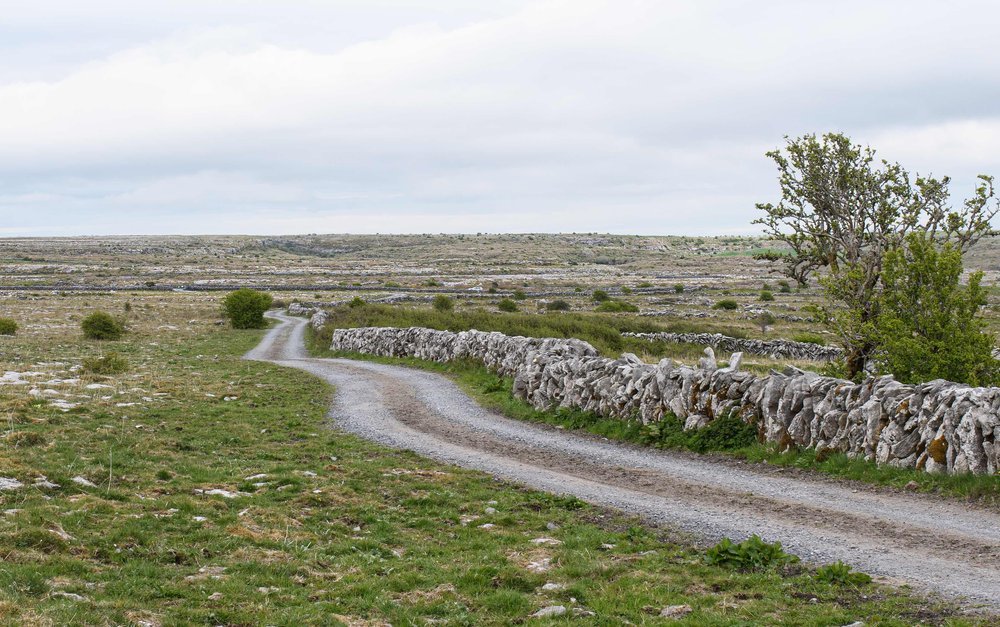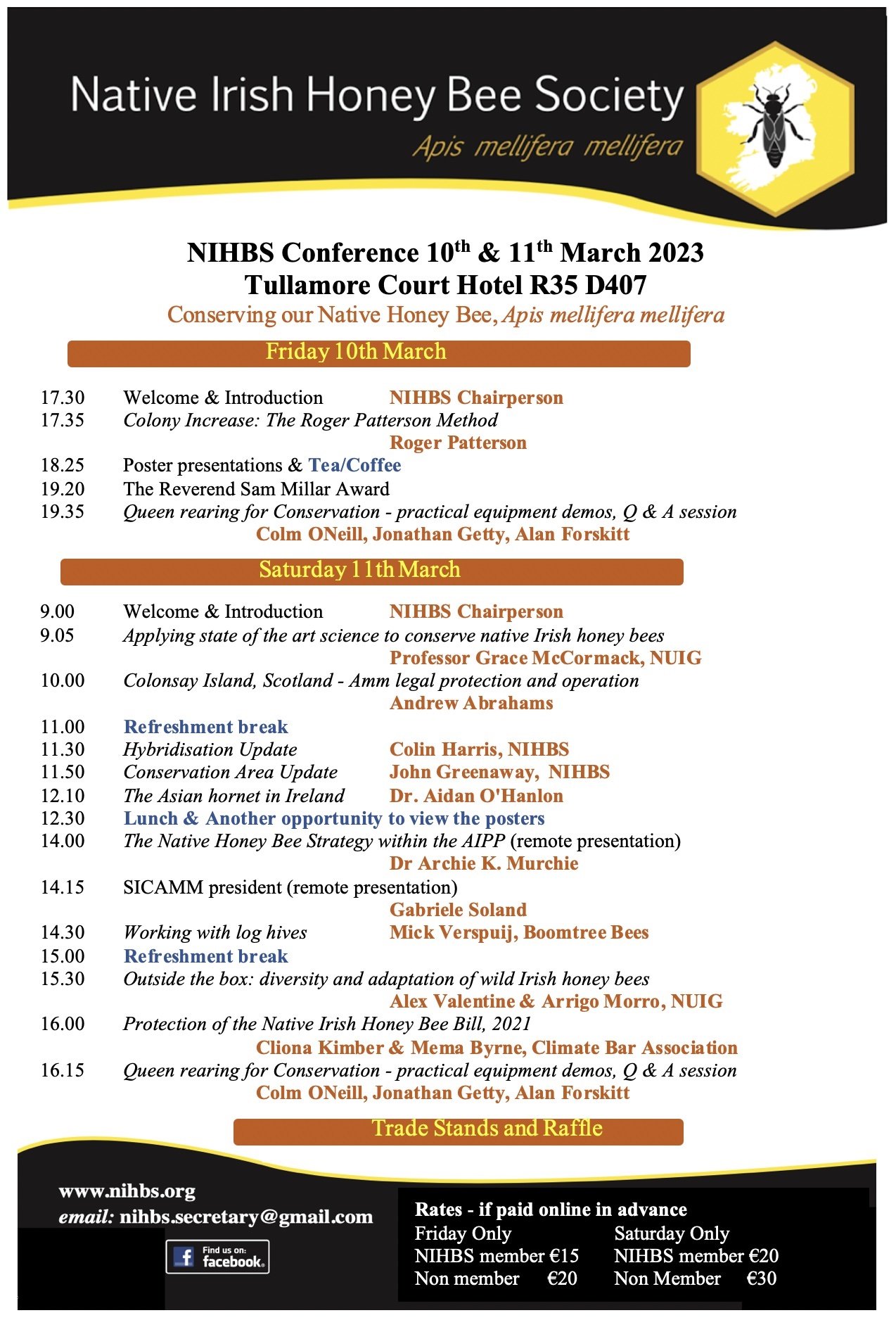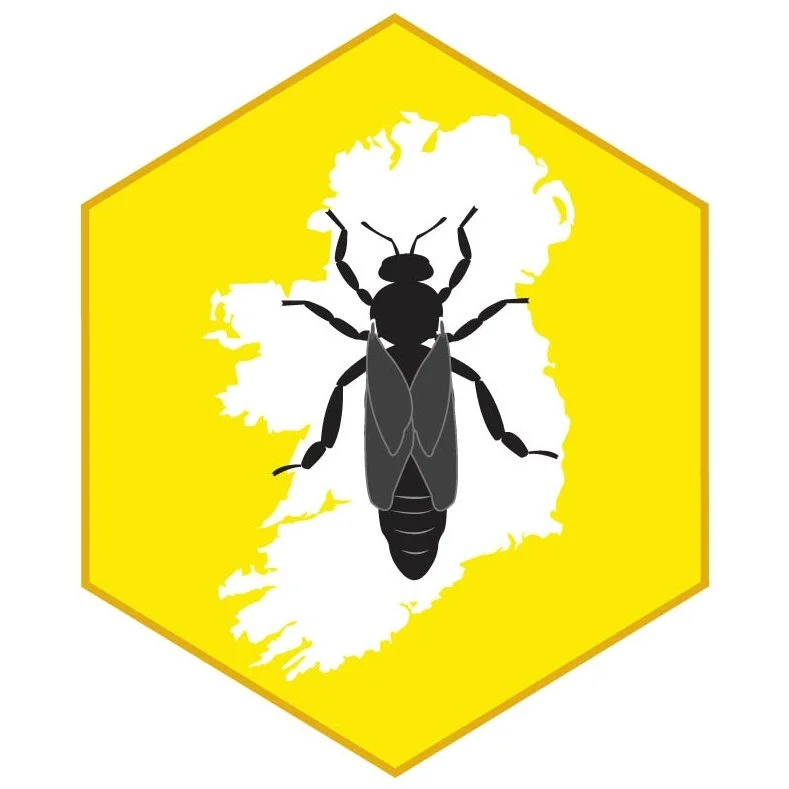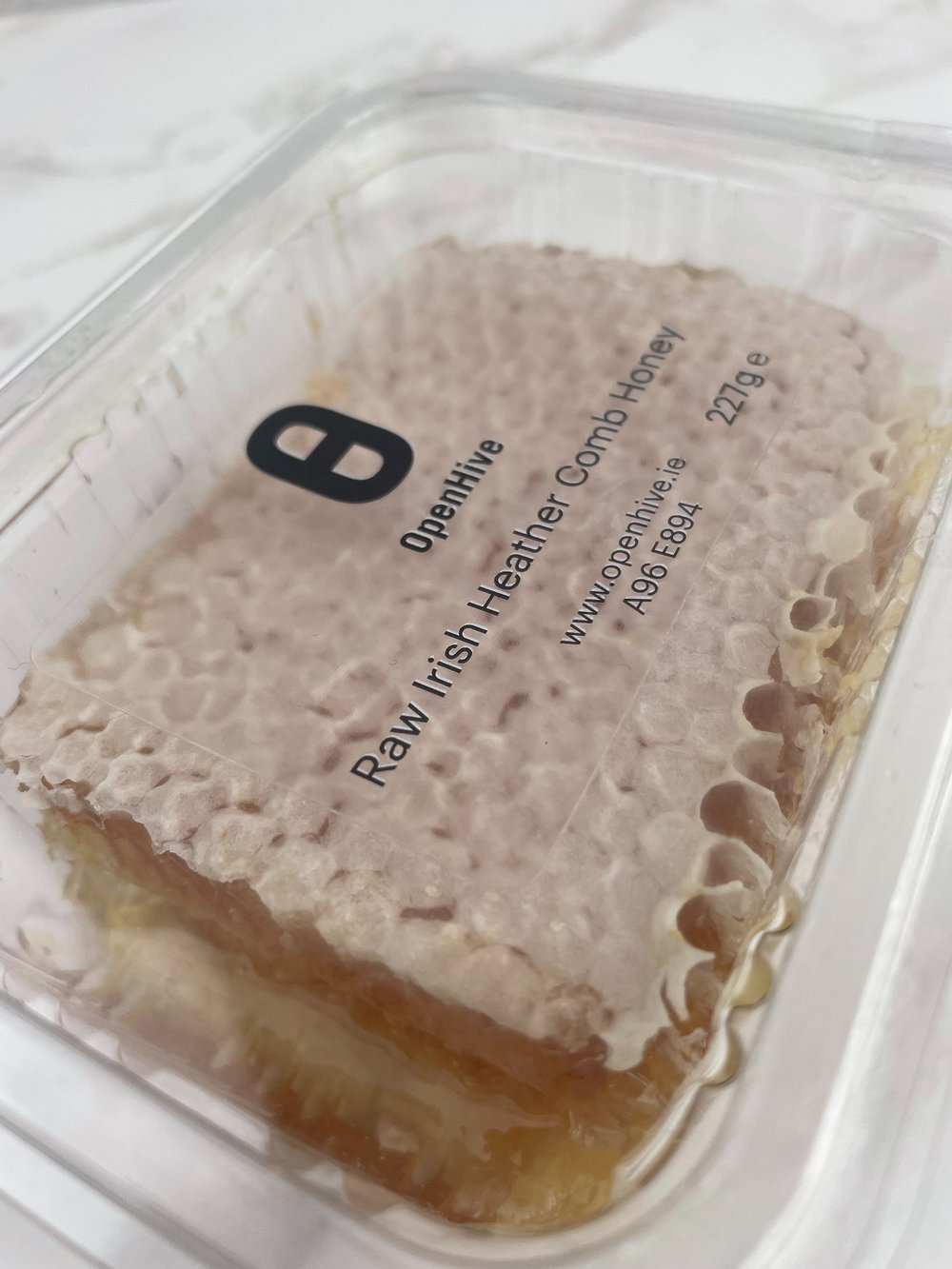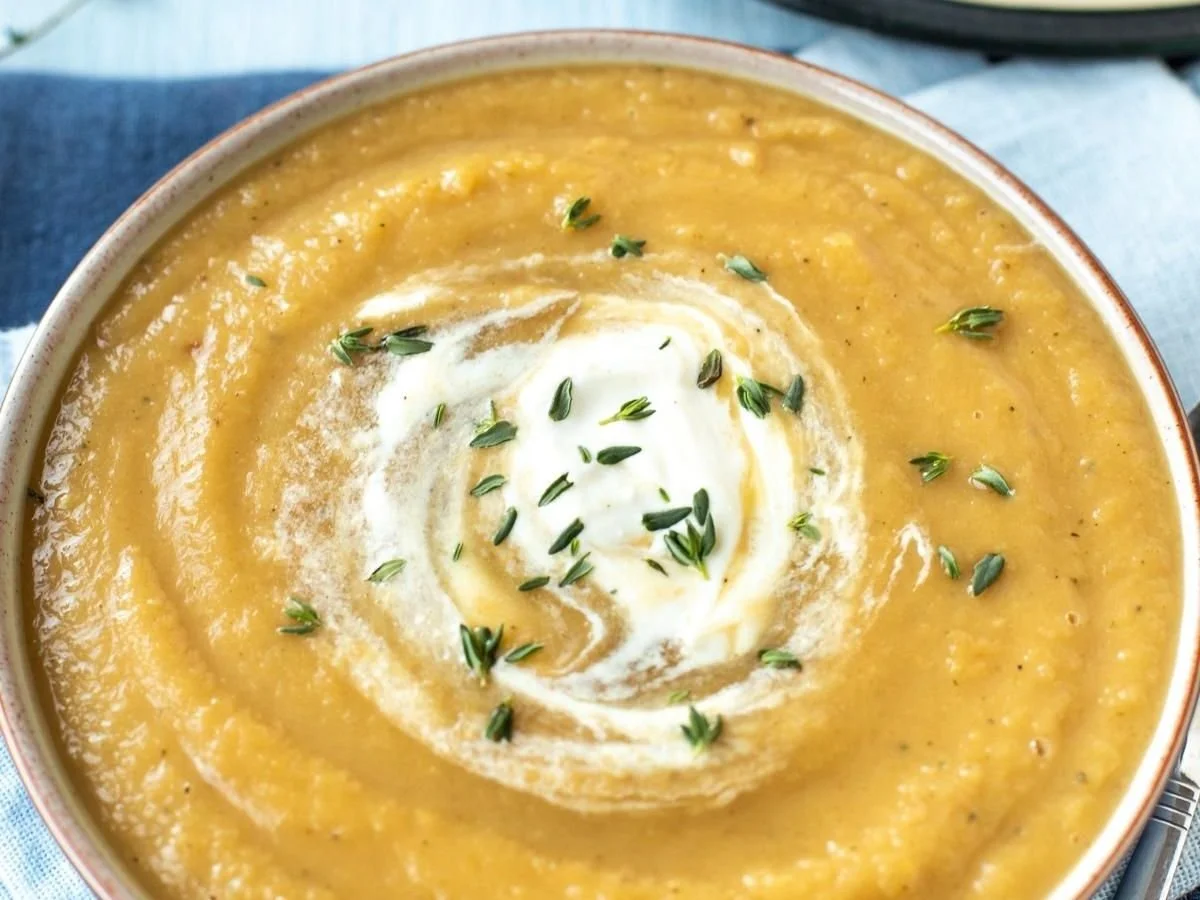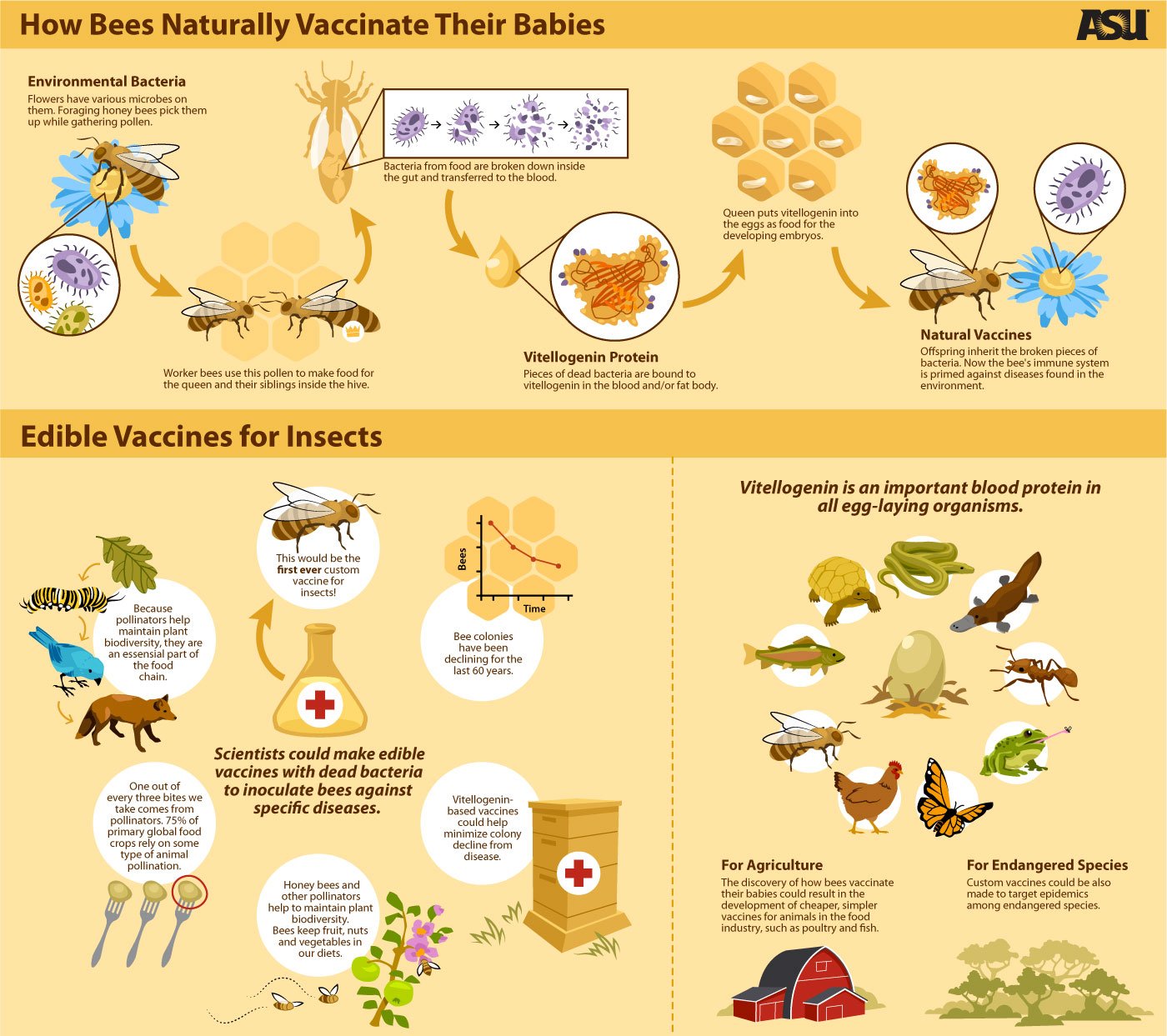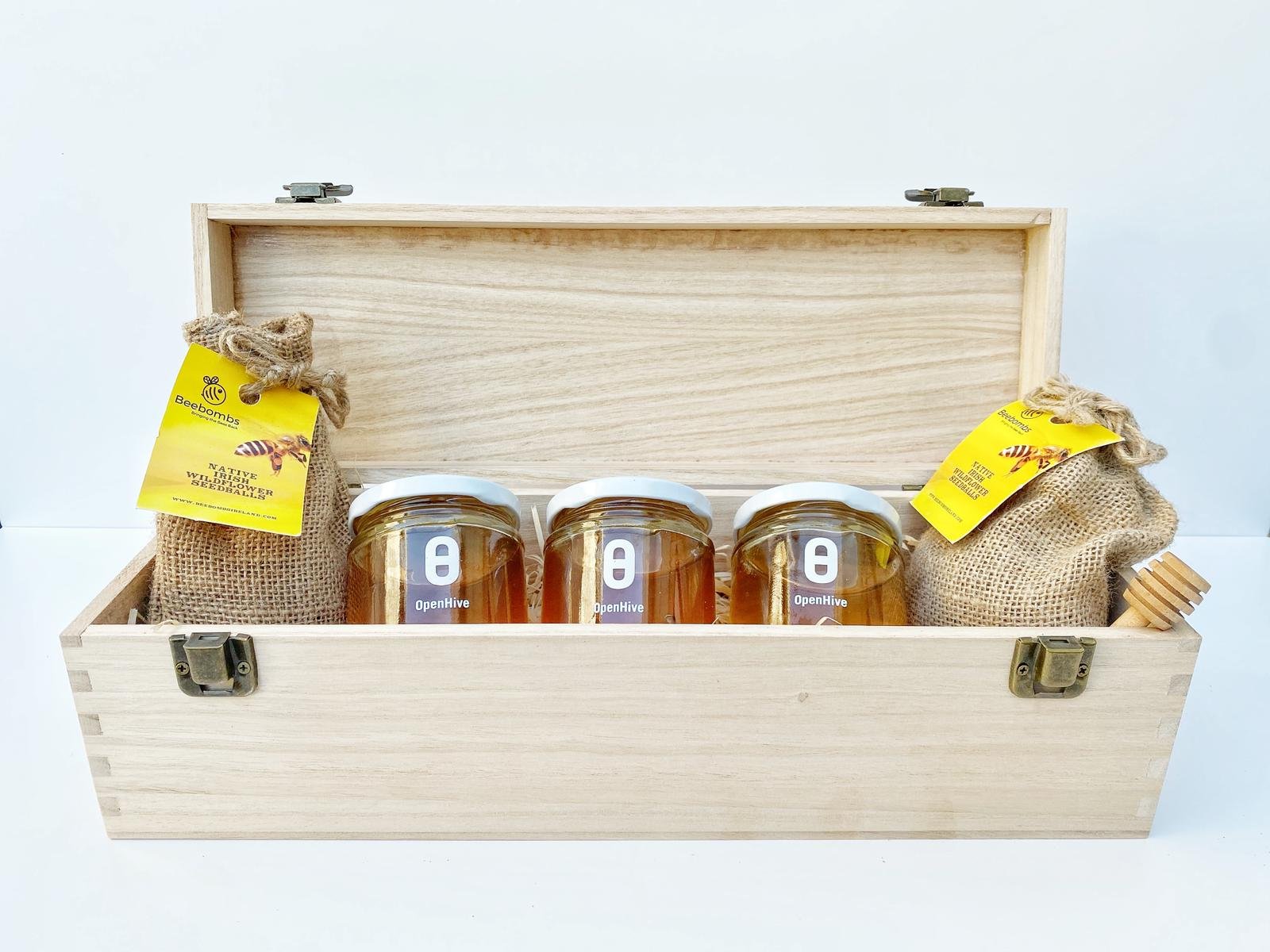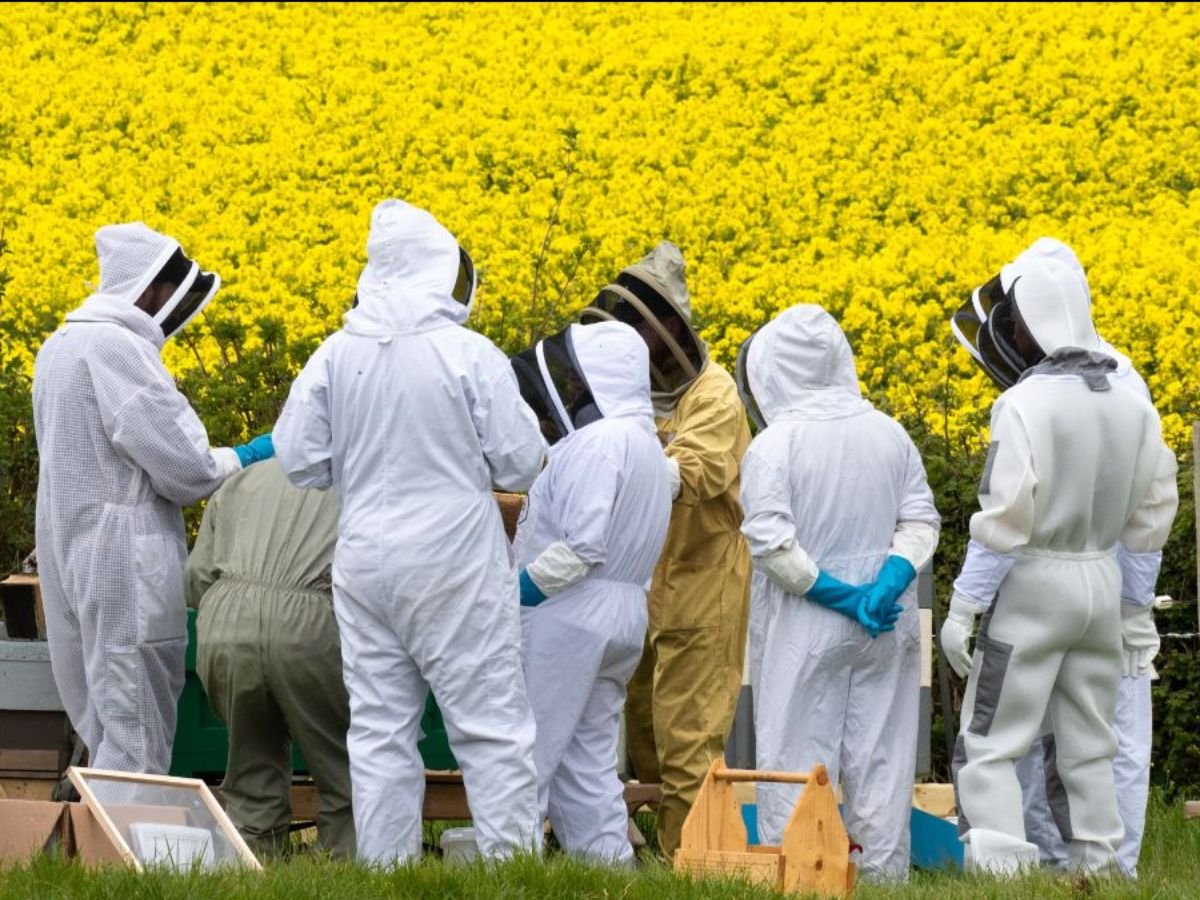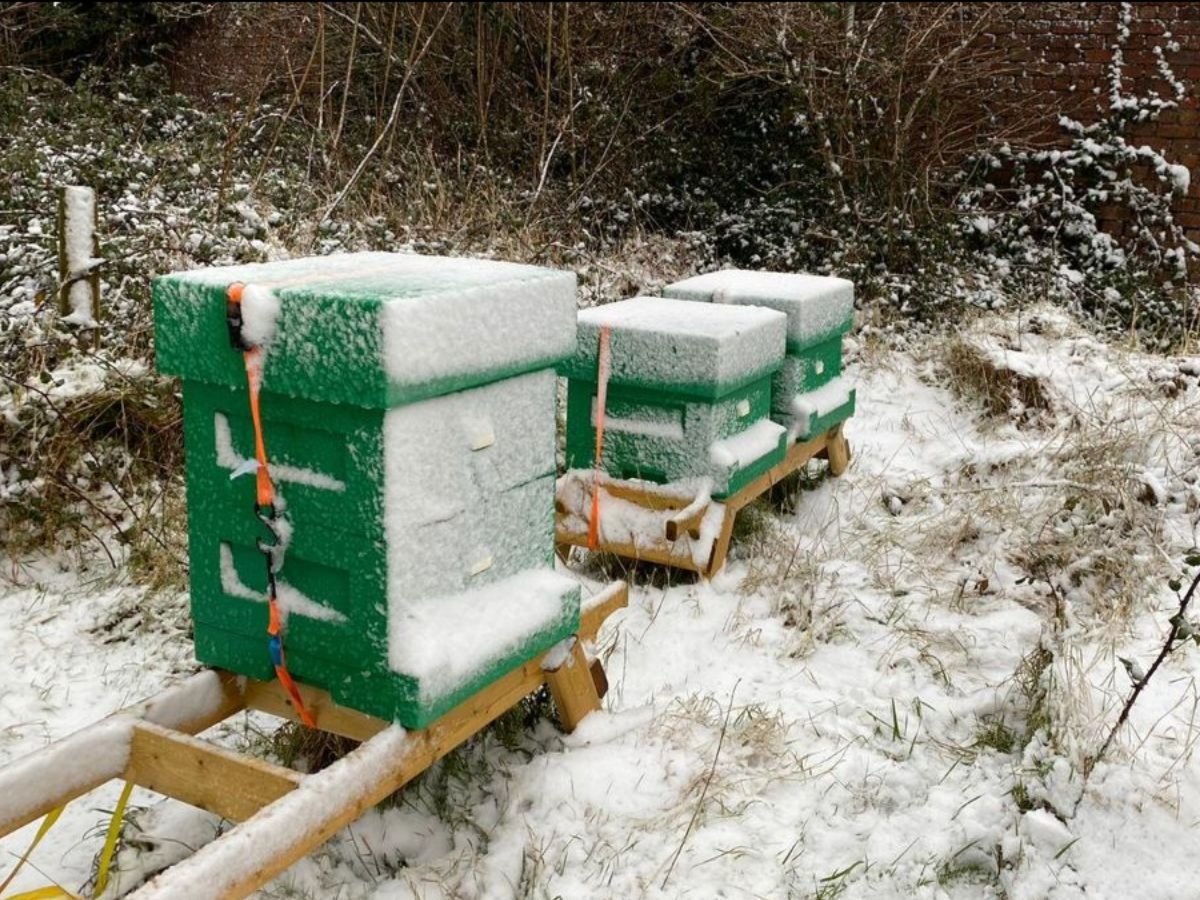One of the more exciting apiaries that we are developing this year is in Clare with the wonderful team in Ard Bia. Our native Irish bees will be part of their Summerage project in the Burren: "established to respectfully honour this land of unique topography with plans to support and harness further what is naturally there. Steeped in history, Summerage celebrates a simple and slower pace of life. Here, nature takes centre stage to make the space habitable in a modern and ecological way. Creating a more localised economy and supply chain is just one of the elements to Summerage. In time, the property structures will be restored for retreats, to bring people together through connection, creativity, well-being and finding a place of calm in a very busy world." We can't wait to get started.
OpenHive Partnership Programme: Opinions
Opinions are one of our latest hive partners. We are delighted to welcome these new partners and look forward to bringing them to meet their hive in the coming months.
What do they do?
'Put simply, we do what it takes to resolve your business challenges or fill gaps in consumer, customer or social understanding.
With a toolkit that covers all types of research; quantitative and qualitative, and a highly experienced consulting team they go beyond the data to bring strategic clarity and confidence.
Their impact on sustainability.
Last year they invested to achieve a verified Net Zero in 2022. They implemented a number of initiatives underpinning this endeavour including travel and commuting support for staff, office and energy-based efficiencies. However, they also completed 'Opinion’s native Irish tree planting programme' delivered in partnership with Hometree that saw them planting over 1,000 native trees last year in West Clare.
Get in touch
We look forward to building our relationship with like minded partners. Get in touch with us to find out more.
We can tailor our offering to help your companies achieve their Environmental, Social, Governance (ESG) goals or fulfil their Corporate Social Responsibilities. Help us to conserve our native Irish honey bee. Read more here: OpenHive Partnership.
Recipe Corner: Honey Glazed Halloumi
A tasty, straightforward and healthy recipe with honey at it’s heart!
Ingredients:
600g of halloumi cheese
5 tablespoons of OpenHive honey
1 medium lemon
4 sprigs of thyme
2-3 tablespoons of olive oil
Method:
Slice the halloumi in 1cm thick pieces
In a small bowl, add the honey, the juice of the lemon and the thyme leaves. Mix well.
Add one layer of halloumi slices to an air tight container. Spoon over a layer of the honey lemon dressing. Add another layer of halloumi on top, add dressing - repeating until all the cheese has been added. Pour over any remaining dressing.
Place the container in the fridge to marinate for as long as you can - a minimum of one hour. Overnight if possible!
Every now and then, turn the container upside down so the dressing can marinate and coat the cheese on all sides.
Heat some of the olive oil in a pan on medium heat. Once heated, gently place some of the halloumi cheese in the pan. Don't overcrowd the pan or have the pieces of halloumi touching.
After 2-3 minutes - when you have a nice sear, turn the cheese around. After another minute, add a few spoons of the dressing to glaze the cheese. Once the second side has seared, remove from the pan and add to a plate.
Keep repeating this process until all cheese is cooked.
Upon serving, add a few more spoons of the honey dressing to coat the cheese, then dig in and enjoy!
Recipe & Photo Credit: Cooking with Ayeh
NIHBS Conference
Over the weekend, OpenHive were one of many beekeepers to attend the annual National Irish Honey Bee Society conference in Tullamore. We heard some fascinating speakers talk about a range of beekeeping topics, updates on the work being done by NIHBS and more. Some of the standouts for us included Roger Patterson’s discussion about colony increase, Grace McCormack’s work from NUIG and Andrew Abrahams’ talk about his island beekeeping and consrrvation work in Scotland.
We also met many of the beekeepers we have worked with and hope to work with in the future. It was a very well structured and attended event and we hope to attend again next year!
OpenHive's Wicklow Heather Honey
Our heather honey was a finalist in the Blas na hÉireann Irish Food Awards 2022 and recently won a star in the Great Taste Awards 2022.
Heather honey is a delicious delicacy. Dark in colour, it can be reddish/orange to dark amber with its own particular flavour unlike that of any other honey.The taste is tangy, pungent, smoky, and mildly sweet, leaving a long aftertaste. The heather in the Wicklow mountains only flowers for roughly 2-3 weeks a year so it's always dependant on getting good weather for that window. You can pick some up here.
Our heather honey was produced in the Wicklow mountains in August 2022. We sell it on the comb just how the bees made it. Heather honey has been recently studied by Trinity and DCU to show it has comparable health benefits to Manuka honey. You can read that study here.
Recipe Corner: Honey roasted parsnip soup
Something to keep us all warm during the cold snap…
Ingredients:
300 g parsnips (~ 2 large parsnips)
1 onion
1 tablespoon olive oil
1 tablespoon OpenHive honey
Salt
Black pepper
Few sprigs fresh thyme
750 ml (~ 3 cups) hot vegetable stock or water
2 tablespoon cream, to serve (optional)
Method:
Peel the parsnips, and cut them into finger-sized sticks. Peel the onion, and cut it into a few wedges.
Lay the vegetables on a baking tray, and drizzle with olive oil and OpenHive honey. Sprinkle over plenty of salt and pepper, and mix to combine. Spread the vegetables out into a single layer, and lay a few sprigs of fresh thyme on top.
Roast at 190°C (Gas Mark 5 / 375°F) for around 30 minutes, stirring once halfway.
When the vegetables are crispy, remove any thick thyme stalks from the tray (you can leave the leaves or any thin stalks). Then transfer the veg to a large saucepan (if using a hand blender), or straight into an upright blender.
To deglaze the pan, carefully pour a few tablespoons of boiling water onto the baking tray, and leave it to sit for a couple of minutes. Use a non-metal spoon or spatula to gently scrape any leftover crispy bits off the bottom of the tray, then tip the whole lot into the pan or blender.
Adding additional stock or water as necessary (I used about 3 cups of vegetable stock in total), blend the soup until it reaches your desired consistency. If needed, you can place the pan over the heat for a few minutes to ensure it's piping hot before serving.
If desired, serve topped with a swirl of cream and a few extra fresh thyme leaves.
Recipe & Photo Credit: Easy Cheesy.
Photos from 2022
As the build up to the 2023 beekeeping season begins, we’ve chosen some of our favourite OpenHive photographs from last season to share with you. These are taken by the excellent Kieran Neary. Enjoy!
Meet Our Volunteers: Siobhán McNamara
Siobhán McNamara joined Open Hive as a volunteer in 2022. She is School Librarian in Gonzaga College SJ (site of one of OpenHive’s apiaries) and also coordinates the school’s Green Schools programme. Her special interest is biodiversity and she has led initiatives such as hedge planting and the establishment of All-Ireland Pollinator Plan wildflower areas on the school grounds.
Siobhán volunteers with Bloomin’ Crumlin, a community-led greening initiative, where she has been involved with projects such as distributing fruit trees for residents to plant in their gardens, and the ongoing development of a Community Biodiversity Action Plan for the Crumlin area.
Siobhán’s other main area of interest is active travel. Having rediscovered the many benefits of cycling as transport a few years ago, she would love more people to feel safe and comfortable walking, wheeling or cycling around Dublin. Siobhán is Vice Chair of Dublin Cycling Campaign and an Executive Committee member of Cyclist.ie, the national network of cycling advocacy organisations. She fully shares Dublin Cycling Campaign’s vision of a city where people of all ages and abilities can get around safely by bike or trike.
Look out for her in the upcoming St Patrick’s Day Parade, where Dublin Cycling Campaign will have a ‘Bikes and Biodiversity’ pageant, a fortunate combination of her two passions. The pageant will be a vibrant and colourful celebration of Ireland’s various habitats.
‘I had done an introductory beekeeping course in 2019 to learn how a honeybee colony works and to find out how honeybees fit in to the wider ecosystem. I found it all fascinating. Volunteering with OpenHive was a great chance to get some practical experience over the course of a full beekeeping season, from building frames in the early spring to harvesting the honey at the end of the summer. I am still amazed at the complexity of the colony. I’m very thankful to Jack, Kyle, and Mark for sharing their knowledge in a supportive and constructive way, and I’m so glad to have met the other volunteers with their wide range of interests and skills.’
Making Waves...
We recently came across a fascinating study from back in 2019 about how honeybees can survive drowning by generating ripples on water surfaces! If a honeybee falls into a pond, their wings get wet and can’t be used to fly. A team of researchers at the California Institute of Technology found that when bees drop into bodies of water, they can use their wings to generate ripples and glide toward land. To quote the scientists involved:
We report the honeybee’s propulsion at the air–water interface. Honeybees trapped on a water surface use their wings as hydrofoils, which means their wings generate hydrodynamic thrust. The surface wave and flow patterns generated around the bee are the first indication that the wings are used as hydrofoils. Furthermore, the water flow measured under a mechanical wing model showed that both net and oscillatory thrust contribute to their locomotion.
Read the study here.
New stockists for 2023!
We are delighted to have some new stockists signed up for 2023 and beyond. It’s always nice to meet new shop owners and talk through who we are, what we do and then agree that both visions line up together. You can pick up our honey in many places (full list here) but for now, here are the newest additions!
Partners at Law (Dun Laoghaire, Co. Dublin)
Robbie’s Green Grocer & Food Store (Stillorgan, Dublin 14)
The Punnet Health Store (Glasthule, Co. Dublin)
Thyme Out Gourmet Food Shop (Dalkey, Co. Dublin)
Irish Beekeeping Events
Over the coming months there are a number of important events taking place in Irish Beekeeping. First up is the Federation of Irish Beekeepers Association (FIBKA) AGM taking place in Tullamore in mid-February. Secondly the Native Irish Honeybee Society (NIHBS) AGM taking place online on the 27th of February and finally the NIHBS Conference which is taking place on the 10th & 11th of March in Tullamore. We are excited to be members of both groups and look forward to attending their events.
OpenHive Volunteers 2023
Beekeeping is one of the oldest forms of agriculture. For thousands of years people have been passing on this skill to others. It can take years to learn all that is needed to keep bees proficiently. But every experienced beekeeper had to start at the beginning. It can be daunting to start out on this journey, which is why we take on a volunteer team each year. We give people the skills and confidence to keep their own bees.
Each year we take on a small group of volunteers. Education forms a huge part of what we do at OpenHive and we really enjoy teaching like-minded people the skills we have picked up as beekeepers over the years. There is a lot of hard work involved but we feel like there is a huge amount to gain as a result.
To apply for our volunteer programme, please fill out the application form on our website: OH Volunteers. Please note that applications close on Monday February 13th.
Wicklow mountain Heather Honey
Heather honey is dark in colour and can be reddish/orange to dark amber with its own particular flavour. It is a favourite with many people. The taste is tangy, pungent, smoky, and mildly sweet that leaves a long aftertaste.
We love heather honey - it’s a real delicacy. The heather in the Wicklow mountains only flowers for roughly 2-3 weeks per year so its always very reliant on getting good weather for that window. Thankfully this year we had a great harvest and are really proud of this delicious honey.
We were very excited to receive a bronze medal award from Blás na hÉireann in August of 2022 for our heather honey.
Heather honey been recently studied by Trinity and UCD (2018) to show it is comparable to Manuka honey. Ours comes from Wicklow and was harvested in the late summer.
Extracting this delicacy requires a lot more work than regular honey. Each year we move the hives up to the heather when it begins to flower. Heather is generally located in remote areas of the mountains which can be difficult to access. The honey is also known as a thixotropic honey, meaning it is like a gel rather than a liquid, and therefore, can not be spun out like regular honey.
You can order it here - enjoy!
A vaccine for bees?
The world’s first vaccine for honeybees has been approved for use by the US government, raising hopes of a new weapon against diseases that routinely ravage colonies that are relied upon for food pollination.
At the start of January we read an interesting article from The Guardian about a new vaccine in the US targeting foul brood. Approved by the US government, this could be a breakthrough in the fight against bee diseases. It remains to be seen what the long-term effects will be and whether more chemicals in hives in the answer. We will follow with interest as the data becomes available.
Link: The Guardian
Photo: Deviche Designs
NiftyBusiness & East Glendalough School
Last summer NiftyBusiness partnered with us to deliver an educational apiary to East Glendalough School in Wicklow Town. This project is part of their ESG strategy and will start with a three year programme. The apiary will allow the staff of NiftyBusiness and the school to engage in conservation work with OpenHive.
EGS were delighted to host a team from Nifty Business who cleared the site and constructed the apiary at the end of the summer in 2022. We look forward to sharing more about this apiary when the beekeeping season begins in March/ April.
New OpenHive Stockists!
We are absolutely delighted to add a number of new stockists to our growing list. Welcome on board:
Ard Bia (Galway city, Co. Galway)
Partners at Law (Dun Laoghaire, Co. Dublin)
Robbie’s Green Grocer & Food Store (Kilmacud, Dublin 14)
OpenHive Beekeeping Experience
We have partnered with Windyridge Nurseries to deliver an exciting new experience for 2023: An Introduction to Beekeeping. Whether you want to learn more about bees or are interested in dipping your toe in the water before starting your beekeeping journey, this is a great way to get up close with our native Irish honeybee. The experience runs for three hours and includes an informal talk (about our bees, the beekeeping season, harvesting honey etc.), a honey tasting session and of course hands on practical beekeeping. For many more details and to book a spot on the experience please visit our website - Beekeeping Experience.
Overwintering Honeybees
Heading into winter can be a testing time for bees as the temperatures drop and there is no longer much to forage on. The fate of each colony will depend on how well prepared they are for winter - is there enough stores (of honey)? Is the hive safe? How big is the colony?
The bees will from a cluster to keep warm made up of a generation of bees with different physiological characteristics from those of the summer population. The winter bees are larger, stronger and have a longer lifespan to last the 4-6 months of winter, as opposed to the 6 week cycle of a summer bee. The centre of the cluster will be as warm as 32-37°C!
The social world of honeybees is normally divided into three castes: workers, drones, and queens. But in the winter the male drones die off, leaving only the female castes: the workers and the queen. The queen stops laying in order to maintain the colony's limited food source. She will start laying again in January/February.
The above photo was taken in our Kilpedder apiary in Dec 2021.
Soft Set / Creamed Honey
The first time we launched our soft set honey was at The Taste of Dublin in the summer. It promptly sold out that very weekend! It is now back. Our soft set honey comes from Newcastle, Co. Wicklow and is a smooth and creamy spreadable honey. Soft set, or creamed honey as it used to be known, is made from regular honey in which the natural granulation process is controlled to give a rich and buttery honey texture. There is nothing added to soft set honey except honey that has already granulated naturally over time. We bring our bees down to Newcastle in Co. Wicklow in early spring where they forage on the oilseed rape crop. From that honey we create this soft set variety. Read more and pick up a jar or two here.
The Dublin Honey Show
Last weekeend saw the annual Dublin Honey Show take place in Dundrum. This event allows beekeepers from all across the county, and indeed, further afield, to gather together and compete for prizes. There were over 30 categories from light honey to dark honey, from beeswax products to bee photography! It was lovely to be able to be there for the day and enter a few of the categories. We were delighted to see our Soft Set honey be deemed as Highly Commended in it's category! A big thanks the County Dublin Beekeepers Association for organising the event and to all the volunteer judges who put so much time into it for everyone else's benefit. Everyone is welcome, it's not just for beekeepers!, so be sure to drop in next year.

